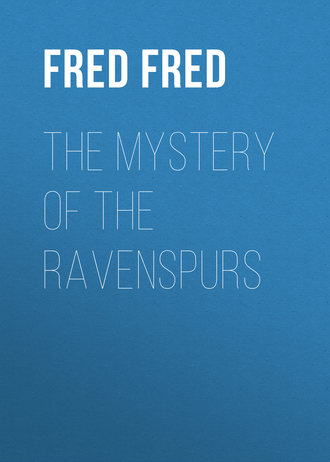 полная версия
полная версияThe Mystery of the Ravenspurs
Ralph shook his head.
"Mysterious as ever," he said. "The miscreant is by us, almost in our hands, and yet we cannot touch him. Vera has been rendered insensible by a drug. The effect of it will pass away in time. She will sleep till morning, and you had better remain with her."
"Of course, I should not dream of leaving the poor child alone."
Ralph just touched Marion's cheek.
"You are a good girl – an angel," he murmured. "What we should do without you I cannot say. Stay here and have no fear. I shall not be far away. I am going to sleep for the rest of the night on the floor outside."
"On the floor, my dear uncle?"
"Bah! it is no hardship," said Ralph. "I have had far less comfortable quarters many a time. I am used to it and like it. And I sleep like a hare. The slightest noise or motion and I am awake instantly."
Marion raised no further protests. This singular individual was in the habit of doing as he pleased, and nothing could turn him from his humor.
He bade Marion good-night and softly closed the door. But he did not lie down at the head of the stairs. On the contrary, he crept quietly down to his room again.
There Tchigorsky and Geoffrey waited him. The lamp was once more lighted. Tchigorsky had a grin on his face.
"Foiled her?" he asked. "I heard you."
"For the present, at any rate," Ralph replied. "That charming woman does me the honor to regard me as a benighted idiot."
Tchigorsky dropped into a chair and rocked to and fro, shaking with noiseless mirth.
CHAPTER XXXII
MORE FROM THE PAST
Geoffrey looked from one to the other for explanation.
"Won't you tell me what has happened?" he asked.
"As a matter of fact, nothing has happened," Ralph replied. "A little time ago Tchigorsky outlined a bold stroke on the part of the foe. He suggested that it was possible, without removing a single bolt or bar, to spirit away one of the family, who would never be heard of again. Tchigorsky was making no prophesy; he was speaking from knowledge. Well, the attempt has been made and it has failed."
"Who was the victim, uncle?"
"Your cousin, Vera. Sit down, my boy; if you go plunging about like that you will ruin everything. Did I not tell you that the attempt had been made and had failed? Vera is safe for a long time to come."
Geoffrey dropped into his seat again.
"How did you manage it, uncle?" he asked.
Ralph gave the details. He told the story dryly.
"So I not only prevented the dastardly attempt to carry Vera away," he concluded, "but I baffled the foe altogether. There was not the slightest suspicion that I was on the stairs except by the merest accident."
"But you say that Marion was with Vera?"
"She was. That nimble wit of hers led her to suspect danger. But Marion could not have averted the tragedy. A slender girl like her could have done nothing against a strong and determined foe. If necessary, she would have been carried off and they would have killed two birds with one stone."
Geoffrey shuddered. He was sick of the whole business. For the moment he was a prey to utter despair. It seemed hopeless to fight against a foe like this, a foe striking in the dark and almost moving invisibly.
"Some one ought to watch that room," he said.
"It is unnecessary. I am supposed to be sleeping close by. Already the foe has learned that I slumber with one eye open. Don't be cast down, Geoffrey. Two more of the enemy are on their way to Yorkshire, and when they are here the mouth of the net is going to close. I pledge you my word that no further harm shall come to anybody. And Tchigorsky will say the same."
"On my head be it," Tchigorsky muttered. He twisted a cigarette dexterously with his long fingers.
"There is nothing to fear," he said, "nothing with ordinary vigilance. The danger will come when the time for defence has passed and it is our turn to attack. Then there will be danger for the three of us here. Shall we go to bed?"
"I could not sleep for a king's ransom," said Geoffrey.
"Then we will chat and smoke awhile," said Tchigorsky. "If you like, I will go on with the history of our adventures in Lassa."
Geoffrey assented eagerly. Tchigorsky proceeded in a whirl of cigarette smoke.
"We knew we were doomed. We could see our fate in those smiling, merciless eyes. That woman had lived among civilized people; she knew Western life; she had passed in Society almost for an Englishwoman.
"But she was native at heart; all her feelings were with her people. All the past could not save us. She meant us to die, and die with the most horrible torture under her very own eyes. Her life in India was a masquerade – this was her real existence.
"'You fancy you are the first,' she said. 'Did you ever know a Russian traveler, Voski by name? He was very like you.'
"I recollected the man. I had met him years before, and had discussed this very Lassa trip.
"'Yes,' I said, for it was useless to hold up our disguises any longer. 'What of him?'
"'He came here,' the princess said. 'He learned some of our secrets. Then it was found out and he had to walk the Black Valley. He died.'
"All this was news to me. So astonished was I that I blurted out the truth. Only a year before, long after Voski was supposed to be dead, I had met him in London. When I mentioned Lassa he changed the subject and refused to continue the conversation. I fancied that he suspected me of chaffing him. Now I know that he had been through the horrors of the Black Valley and – escaped.
"The eyes of the princess blazed when she heard this. She was a wild devastating fury. It seemed almost impossible to believe that I had seen her in a tea gown at Simla, chattering Society platitudes in a white sahib's bungalow. And I bitterly regretted betraying myself, because I knew that, wherever he was, Voski would be hunted down and killed, as they were seeking to kill me, as they would slay Ralph Ravenspur, only they have not recognized him."
"Hence the changed face and the glasses?" Geoffrey asked.
"You have guessed it," said Ralph. "I did not want to be known. I am only a poor demented idiot, a fool who cumbers the ground."
"I had betrayed Voski without doing any good to myself," Tchigorsky resumed. "If any harm has come to him, I am his murderer. Presently the princess calmed down, and the old cruel mocking light came back to her eyes. We were speaking English by this time – a language utterly unknown to the awestruck, open-mouthed priests around us.
"'Let us pretend that this is my drawing room in India, and that I am entertaining you at tea,' she said. 'Later you shall know something of me in my real character. I suppose you recognized the risks that you ran?'
"'Perfectly,' I replied. 'We are going to be done to death in barbarous fashion, because we have come here and learned your secrets as your husband did.'
"I could afford this shot. I could afford to say anything. We were going to perish by a death the horror of which is beyond all words, and had I pulled the nose of the princess, had I strangled her as she sat there, the punishment could have been made no worse.
"'Take care,' she said, 'you are in my power. What do you mean?'
"'I mean that your husband penetrated the secrets of Buddha, and that you married him so as to regain those secrets. There were papers and the like, or he would merely have been assassinated in the ordinary vulgar manner, and there would have been an end of the business. Your husband has got an inkling of this and that is why he has hidden the documents and refuses to give them up; he would be murdered if he did.'
"'You are a bold man,' the princess said.
"'Not at all,' I replied. 'A man can only die once. Would you say that the condemned murderer was rash for attempting to pick the pocket of the gaoler, even for attempting to murder him? What I say and what I do matters nothing. And you know that I am telling the truth.'
"The princess smiled. My friend Ralph here will remember that smile."
"I could see then," Ralph muttered, "and I do remember it."
"'Very well,' the princess replied, 'you are candid and I will be the same. What you have said about my husband is perfectly true. I did marry him to recover those papers. And when I accidently let out the truth that I was not outcast of my tribe he saw his danger. He is safe till those papers are mine. And then I shall kill him.
"'And yet I love that man – I shall be desolate without him. But my religion and my people come first. For them I lose my caste, for them I degrade myself by becoming the wife of a white sahib, for them I shall eventually die. And yet I love my husband. Ay, you cannot command the human heart.'
"At this I laughed. The princess joined me.
"'You think I have no heart,' she said, 'but you are mistaken. You shall see. For the present I have my duty to perform. I do it thus.'
"She rose to her feet and clapped her hands and spoke in terse, vigorous sentences. A minute later we were bound and our disguises slipped from us. And there for the present you must be content to leave us. To-morrow I shall tell the rest."
Tchigorsky rose and yawned, but Geoffrey would fain have had more.
"The princess," he said; "at least tell me if I know her."
"Of course you do. Princess Zara is the woman who calls herself Mrs. Mona May."
CHAPTER XXXIII
VERA SEES SOMETHING
It was nearing dawn when Vera came to herself out of an uneasy slumber. The darkest hour that precedes the faint flush in the eastern sky was moving away. There was a light in the room.
Vera rubbed her eyes wondering. It was one of her fancies to have no light in her room. Better to lie with horrors she could not see than have the glimmer from a nightlight filling every corner with threatening shadows.
Vera sat up in bed, forgetting for the moment that she had a racking headache. Something had happened while she slept. Something was always happening in that house of fears, so that Vera was conscious of no new alarm. In a big easy chair at the foot of the bed Marion reclined, fast asleep.
Vera checked an impulse to wake her. In that miserable household sleep was the most blessed of all luxuries. Why, then, should Marion be disturbed? Doubtless she had come there to protect and, doubtless the girl would know all about it in the morning.
"I will not wake her," Vera murmured.
But she could not sleep herself. The splitting, blinding headache was very much in evidence just now. Vera felt that she would give anything for a glass of cold spring water. She poured out that in her own bottle, but it was flat and tepid.
She would go down into the stone-flagged outer kitchen, where the pump was, and get some fresh. In any case, she had not the least idea of going to bed again. Vera partly dressed herself, doing up her hair in a big shining knot, and then, in slippered feet, crept down to the kitchen. She had no need of a light – there was already enough to show the way.
How cool and refreshing the water was! She drank a glass and then laved her face in the crystal fluid. All headache was gone by this time, though Vera had a curious trembling of her lower limbs that she could not account for.
She opened a side door leading into a green quadrangle, and from there made her way to the terrace. For a few minutes she stood in a dark angle facing the house, just picked out, as it was, from the gloom. Along the dim corridor some one was advancing with a light.
What could it mean? What was going on? Vera crouched close into the dark corner. She had an idea that she was going to witness something.
The light in the corridor stopped and grew brighter. From the black shadow of the house a human figure crept out and slid along the terrace to a spot where it was just possible for a man of strong courage and cool head to make his way down to the beach at low tide. At high water the sea swept the foot of the cliff.
Vera strained her eyes to make out the figure. It passed so close to her that she might have touched the hem of the white diaphanous garment about it; a faint, sour kind of perfume was in the air. These swiftly flying feet made not the slightest noise. Vera guessed at once that this was one of the Orientals whom she and Geoffrey had seen along the cliffs on a memorable occasion.
She was not far wrong. If not the same, they belonged to the same noisome band. Almost before Vera could recover from her surprise another figure followed.
Vera watched with intense eagerness. Slight and frail though she was, she was not in the least afraid. She came from the wrong race for that. She had made up her mind to know what was going on even if she ran some danger in obtaining the knowledge. And what did that light mean?
She was soon to know. Presently another figure came along, a tall figure which in the gloom bore a strong resemblance to Tchigorsky. The figure wore boots and a European dress and did not seek concealment. By its side was yet another figure also clad in European dress.
"You say this is the place?" the latter man whispered in indifferent English.
"Yes, yes," was the reply, in still more indifferent English. "It is to this place that my master, Dr. Tchigorsky, bade me bring you. And there is the signal."
The light in the corridor waved again.
"I am not satisfied," the stranger muttered. "I am in great danger."
"But not here," the other said eagerly. "Nobody knows you are here. The princess has not the least idea of your presence. And Dr. Tchigorsky, my master, bade me hunt for you until I found you. And I have done it."
"Oh, yes, you have done it right enough. And Dr. Tchigorsky would not have sent for me unless there had been danger. But why not meet him in daylight in a proper and natural manner?"
The other spat gravely on the pavement.
"The doctor is a great man," he said. "He knows. Would you have your enemies to guess that you have seen my master? That is why I bring you here at night. That is why there is the great secret."
The tall man muttered something that sounded like an acknowledgment of the force and cogency of this reasoning.
"I dare say it is all right," he said. "Fetch your master."
The servant salaamed and departed in the direction of the house. He returned presently with the information that Tchigorsky had gone along the terrace. There was a summer house a little way off, where Tchigorsky waited.
Vera felt her heart beating faster. There was no summer house along the terrace – nothing but a broken balustrade that Rupert Ravenspur was always going to have mended. Over this there was a sheer drop to the sea below.
As the pair moved on, Vera followed. Then what followed seemed to happen in the twinkling of an eye. A white-robed figure emerged and flung himself upon the stranger. At the same time the other miscreant, who had acted as Tchigorsky's servant, attacked him from behind.
"You rascals," the stranger cried, speaking this time in French. "So I have been deceived. You are going to throw me over the cliff. There is no escape for me. Well, I don't much mind. The agony of suspense has taken all the sweetness out of life for me. I knew that sooner or later this was bound to come. But I am going to take a toll."
The stranger's breath was coming rapidly between his teeth. Vera tried to scream, but no sound emerged from her lips. She stood rooted to the spot, watching what seemed to her a long one-sided struggle. As a matter of fact, it had not lasted more than ten seconds. Gradually the stranger was forced back.
Back and back they forced him to the very edge of the cliff. There was no escape for him now. He reached out two long and swinging hands; he grasped two arms, one for each of his would-be assassins, and then he jumped backwards. Two fearful wailing yells rent the air; there was a mocking laugh, and silence.
Had she really seen this thing or had she dreamed it? Vera was not sure. Just for a brief moment her senses left her. When she came to herself again she crept along to the house and thence to her bedroom. She locked the door and flung herself upon the bed, pressing her hands to her eyes.
"How long will it last?" she murmured. "How long can one endure this and live? Oh, Heaven! is there no mercy for us?"
Then the blessed mantle of oblivion fell again.
CHAPTER XXXIV
EXIT TCHIGORSKY
It seemed to have been tacitly agreed by Geoffrey and Marion that nothing could be gained by telling Vera of the danger that she had escaped. Nothing could be gained by a recital of the dastardly attempt on the previous evening, and only another terror would be added to the girl's life. And, Heaven knows, they all had terrors enough.
On the other hand, Vera had made up her mind to say nothing to the family generally as to her startling adventures. Of course, Geoffrey and Ralph Ravenspur would have to know, but the rest were to be kept in the dark.
Vera's white face and serious air were accounted for by the headache from which she was palpably suffering. Some of the others understood, and they were full of silent sympathy.
"It is nothing," said Vera. "A walk along the cliffs will soon set me right." As she spoke she looked at Geoffrey significantly. He knew immediately that the girl had something important to say to him. He slipped outside and Vera followed him. Not till they were out of sight of the house did she speak.
"Dr. Tchigorsky is still about?" she asked.
"Yes, dear," Geoffrey replied. "As a matter of fact, he is hiding in Uncle Ralph's room. He has his own reasons for so doing, but the reasons are to remain a profound secret. I ought not to have told you. You are not to tell any one."
Vera gave a sigh of relief.
"I promise that," she said. "And I am exceedingly glad to hear that Dr. Tchigorsky is safe. I was not sure whether I had not seen his murder."
Geoffrey regarded Vera in amazement.
"Why, you were in your room all night," he cried. "You were – "
He was going to say "drugged," but he pulled himself up just in time. Vera told her story without further preamble. It was a thrilling story and none the less so because simply told.
"I don't profess to understand it," Vera concluded. "I tell it to you just as it happened. On the whole, I thought it as well to keep the information to myself. I dare say that Dr. Tchigorsky can solve the problem."
"He shall have a chance," said Geoffrey. "I'll tell him after luncheon. But I should not tell a soul else this, Vera."
"I had no intention, Geoffrey. And now, hadn't we better go back and say good-bye to Mrs. May. She is leaving the house directly."
Mrs. May did leave the house in the course of the morning, all smiles and blandishments. She had a particularly tender word and squeeze of the hand for Geoffrey, whom she pressed in a whisper to come and see her before long.
"I will," Geoffrey replied. "You may rely upon that."
It was with a feeling of intense relief that he was rid of her. It seemed hard to believe that the smiling polished woman of the world, the dernière cri of Western civilization, should be one and the same with the fanatic princess of the fanatical East.
There was something wild and bizarre about the very suggestion. There was one last smile for every one but Marion, who had not appeared, and Mrs. May was gone.
Geoffrey made his way up to his uncle's room. There he found the two friends smoking. Tchigorsky looked at him from behind a cloud of thin smoke.
"You have news, my young friend," said Tchigorsky. "I see it in your eyes."
"I have the most important news," said Geoffrey, "only it does not convey any impression to me. It is a discovery of Vera's. She had a fine adventure last night. She was not sure whether or not she had seen your murder, Tchigorsky."
"Say on," Tchigorsky said calmly. "Say on, my boy."
Geoffrey said on accordingly. He fully expected to surprise his hearers, and he was not disappointed. Every word he said was followed with rapt attention.
"And now can you explain it?" Geoffrey asked eagerly.
"To me the explanation is perfectly clear," Tchigorsky replied. "Last night I told you that there were two other parties to the vendetta now in England, and that it was necessary to get them into the net before we close it. That is no longer necessary, for the simple reason that these two men are dead – drowned."
"Do you mean that they perished with that stranger last night?"
"Certainly, I do. A fine determined fellow, whose death I cannot sufficiently deplore. And he had his vengeance upon his foes. If he perished, they perished also."
"But who was he, Tchigorsky?"
"The other man – my fellow-countryman, Voski. Don't you remember my telling you how the princess spoke of him? He has been hunted down at last. They lured him here and destroyed him under the pretence that I wanted to see him. My presumed servant had only to mention my name, and the thing was done."
"But why bring him here?"
"Because the place is so quiet. Because they wanted to give their mistress, the princess, a pleasant surprise. I don't suppose she knew they were coming."
"But the light in the corridor?"
"That was a curious and useless coincidence. The light in the corridor was mine. I was looking for something. Neither of those miscreants was ever in the house at all. At the same time they had naturally been informed where I was. To-day they would have gone to their mistress with the pleasing news that they had despatched Voski. I am certain they were saving the news for her."
"What shall you do about it?" asked Geoffrey.
"I shall not do anything at present," Tchigorsky replied. "I have a little idea that may work out to our advantage later. Meanwhile nobody knows of the tragedy and nobody is to know. This afternoon you are going out fishing in a boat, but in reality you are going to look for their bodies. If you can find them all – "
"We are certain to find them all," Ralph interrupted. "They will be carried round Gull Reef on the spit of sand under the caves and deposited on the beach, whence the tide ebbs at four o'clock to-day. I have not lived here all my life for nothing. We shall find those bodies within a yard of where I say."
"And bring them up the cliff," Geoffrey shuddered. "Ugh!"
"You will do nothing of the kind," Tchigorsky said coolly. "Bring Voski, of course, but you are to bury the two ruffians in the sand. It will be easy to do so, and pile some rocks over them afterwards."
Geoffrey ventured to suggest that such a course might end disastrously, the officers of the law not to know of it. Tchigorsky waved the suggestion aside contemptuously. It was no time for nice points like these.
"Those foul creatures are dead, and there is an end of it," he said. "What can it matter whether there is an inquest held on them or not? If it is, then there will be an end of my scheme. I say you must do this. The future happiness of the family depends upon it. It is also of the utmost importance that Princess Zara does not know of the death of her miscreants."
Geoffrey nodded. He began to see daylight. And, after all, the concealment of these bodies was no crime.
"What do you say, Uncle Ralph?" he asked.
"Say that Tchigorsky is right," Ralph croaked; "Tchigorsky is always right. When we get Voski's body, what shall we do with it?"
"Lay it out in the corridor, where I can get a look at it," said Tchigorsky. "For the present I do not exist – at least, so far as this house is concerned. All you have to do is to follow my directions."
The strange pair set out on their excursion in the afternoon. It was a long pull from the village to the cliffs, but it was accomplished at length. The boat was run aground at the least dangerous spot and Ralph and Geoffrey set out along the sands. The former's step was as free and assured as that of his younger companion.
"Ah," Geoffrey cried, "you are right. There they are."
"I knew it," Ralph replied. "See if they are injured."
Geoffrey steeled himself to his gruesome task. The three men lay side by side as if they had been placed so by human hands.
As far as Geoffrey could judge, there were no signs of violence on the bodies of either of the natives. They lay by each other, their faces transfixed with rage and horror.
Beyond doubt, these men had been drowned, sucked down by the strong current and then cast up again by the sea as if in cruel sport.






